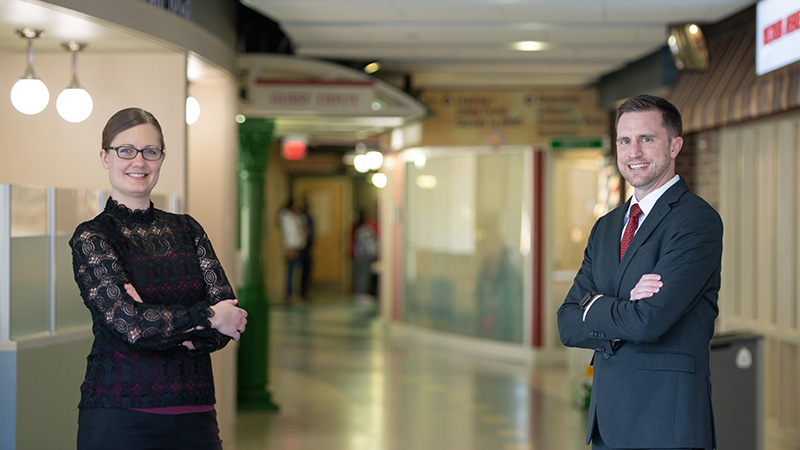
For five days next month, May 15–19, the Department of Pediatrics’ 2023 Research Week will offer daily activities as livestreamed, in-person, and interactive events, including engaging presentations by department experts and small group sessions with faculty members and trainees about the latest advances in pediatric research. This year will bring the second annual Fellows Capstone Presentations, the Wald Faculty Research Forum and Town Hall, the Keynote Lecture, platform presentations, and an in-person poster session with a reception that will feature the work of diverse researchers: residents, fellows, faculty, and staff members. The week’s highlights include presentation of the distinguished Gerard B. Odell Lecture and Award and the Ellen R. Wald Award. A full list of the week’s events is available on the Research Week webpage.
Gerard B. Odell Lecture and Award
The Odell Lecture and Award were established in 1994 to honor Dr. Gerard B. Odell, emeritus professor of pediatrics. Odell was internationally recognized for his research in the field of neonatal jaundice and bilirubin metabolism. In addition to the lectureship, the Gerard B. Odell Research Award was established to honor Dr. Odell’s distinguished career in pediatrics research, academics, clinical practice, and education. The award is given to an assistant or associate professor of pediatrics in recognition of outstanding research accomplishments and demonstrated potential for future contributions in basic or translational research.
This year’s Gerard B. Odell Lecture will be presented by M. Stephen Meyn, MD, PhD, director of the UW–Madison Center for Human Genomics and Precision Medicine and the Jan and Kathryn Ver Hagen Professor of Translational Research (Pediatrics) in the Division of Genetics and Metabolism. Meyn’s lecture will take place on May 18, 7:30 – 8:30 a.m. in person in HSLC 1345 or via Zoom for those who cannot attend in person. His will present the talk “The Promises and Limits of Pediatric Genomic Medicine.”
Directly after the lecture, the presentation of the Odell Award and a talk from the recipient, “Understanding Congenital Zika Virus Infection,” will take place 8:30–9 a.m.
This year’s winner is Emma Mohr, MD, PhD, assistant professor, Division of Infectious Diseases. Mohr is a physician-scientist with a strong interest in improving the health of children affected by infections acquired in pregnancy. She is also engaged in training the next generation of translational scientists, mentoring many trainees in clinical and laboratory settings. While serving as the director of the Physician Scientist Training Pathway, Mohr is also on the Medical Scientist Training Program Admissions Committee.
Her research group, the Mohr Lab, which she has led for four years, was granted simultaneous NIH K08 and R01 funding. Striving to determine the Zika virus’s pathogenesis and long-term neurodevelopment effects, her multidisciplinary team has worked to define developmental deficits in infant macaques with prenatal Zika virus infection. The group’s goal is to identify therapeutic strategies to improve the health of affected children.
Eric Schauberger, DO, PhD, assistant professor in the Division of Allergy, Immunology, and Rheumatology, nominated Mohr for this award with a strong recommendation: “As a physician-scientist myself, I know the significant impact that research has on driving clinical care. I can say without reservation that Dr. Mohr’s research program will have a significant impact on how we understand and manage congenital viral infections in the future.”
Ellen R. Wald Award
The Ellen R. Wald Research Award was established in 2022 to honor Dr. Wald’s distinguished career in pediatrics research, academics, clinical practice, and education. The award is given to an assistant or associate professor of pediatrics in recognition of outstanding research accomplishments and demonstrated potential for future contributions in clinical, health services, or quality improvement research.
The presentation of the Wald Award and a talk by the recipient, “Running and Research: Investigating Neonatal Acute Kidney Injury,” is scheduled to take place 9–9:30 a.m.
This year’s winner is Matthew Harer, MD, associate professor, Division of Neonatology and Newborn Nursery. Harer leads the UW Renal Investigative Neonatal Network (URINN), which focuses on neonatal kidney issues, and he has nationally recognized expertise in neonatal acute kidney injury.
He is the principal investigator of the IKONIC Research Group, which performs clinical and translational studies aiming to improve the diagnosis of acute kidney injury. In this area, his group monitors renal oxygenation and is investigating the kidney protective effects of caffeine.
The UW Institute for Clinical and Translational Research (ICTR) selected Harer for the KL2 Scholars Career Development Program in 2021. This program provides promising clinical and translational investigators with training, mentoring, and protected time to develop an independent research program. Recently, Harer received a Meriter Foundation grant to develop a non-invasive method of detecting a particular newborn heart anomaly.
Nominating Harer for the award, Ryan McAdams, MD, professor and chief, Division of Neonatology and Newborn Nursery, praised him as “an amazing clinician, researcher, educator, and mentor” and “a star who continues to shine brighter every year.”